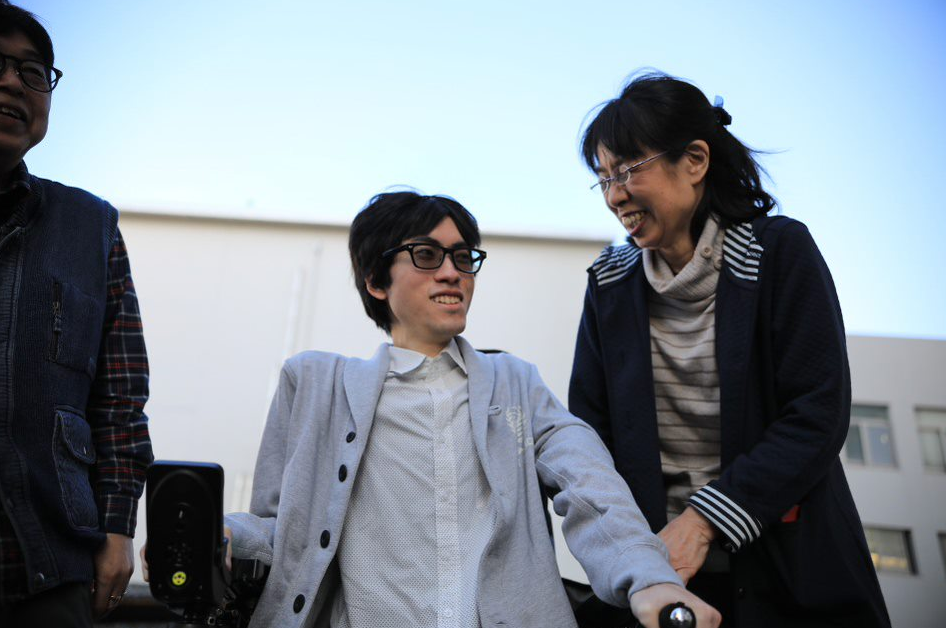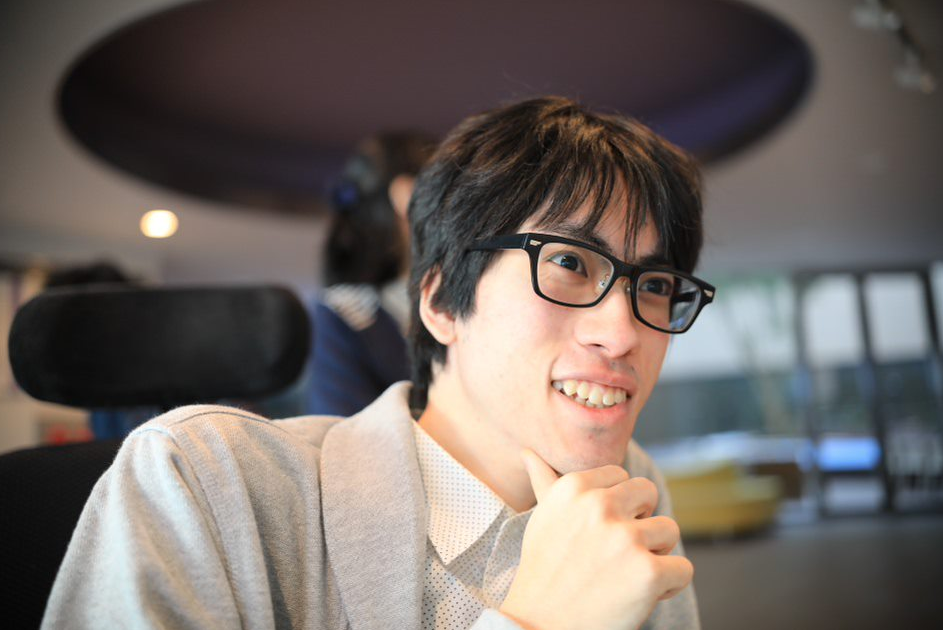Patient Advocacy ⟩ Rare Stories ⟩ Hiroki
While Hiroki’s disease may be limiting, his mind is vast and expansive. He is taking nothing for granted.
The flowering bushes and cherry blossom trees on the Nagoya University campus bloom in deep shades of pink and white. Hiroki maneuvers his wheelchair with ease through the familiar gardens, gazing pensively at the world around him. At university he studies the structures of proteins whose woven strands hold the codes that give life to everything, from the azaleas to human beings. These same strands, when altered by a single mutation, can also give rise to disease. Hiroki knows this experience firsthand. He lives with Pompe disease, which has affected every aspect of his life and inspired his passion for science; specifically, bioinformatics.
From infancy, Hiroki showed signs of illness that bewildered his doctors and frightened his young parents. His mom, Kazumi, recollects holding him, his tiny body burning and flush with frequent unexplained fevers from as young as one month old. As he grew, his limbs started to become weak due to weakness in his muscle tone. With fear in their hearts, his parents brought him to Osaka University Hospital where they did a biopsy of muscle tissue and diagnosed him with Pompe disease at the age of one. “We lived in Osaka then,” explains Kazumi. “We had no idea what Pompe disease was and were told that there was no treatment for it. We were devastated. There was no internet. We tried to look for information, but couldn’t find anything.” At that point, all the doctors could do for Hiroki was bring his fever down and treat his symptoms with pain medication. Pompe disease, his parents learned, is a rare, genetic disorder that causes progressive muscle weakness and loss of control over one’s breathing. Eventually the disease also destroys liver, heart and muscle function. Hiroki’s parents were shaken with the news that their beloved little boy, who was just learning to walk and speak his first words, faced a life fraught with pain and illness.

Hiroki courageously adjusted to his changing physical abilities. He made friends at school, became an ardent student with an expanding interest in science and attended conferences with other people living with Pompe. His parents beamed with pride over his achievements. They rarely spoke about the deterioration or difficulties that lay ahead. The flipside of this optimism was that they also never spoke of the potential of death. It was a taboo subject––one they knew could only be kept in the dark for so long. Kazumi recalls the sobering day that Hiroki learned Pompe was a terminal illness. “There was a TV documentary about Pompe disease. Usually the Pompe patient organization would contact us about a show like this, but this time we hadn’t heard about it, so it was by chance that we were watching it. Hiroki knew he had Pompe, but didn’t know much about it and didn’t know that it could be fatal. As we watched the documentary, there was a patient with a few months of life left. I was frozen. I kept looking at Hiroki’s face.” Hiroki took a deep breath, searching for the right words. “If the doctor says I have X amount of time to live,” he said firmly, “I want to know, because there is a lot left that I want to do with my life.”
Despite the constraints of his weakened systems, Hiroki grew to be a joyful child with bright inquisitive eyes and a shy, but playful demeanor. He seemed to be thriving. So, when he started elementary school, he began to complain of severe headaches, his parents assumed it was a calculated attempt on his part to avoid school where he was sometimes bullied and laughed at for his slowness. However, the doctors took his complaints more seriously. Through several tests it was discovered that the headaches stemmed from breathing complications he experienced during sleep. The doctors encouraged him to use a BiPAP machine at night to help him breath and increase his oxygen levels. His parents secured the plastic mask and tube to his mouth and nose and watched his eyes close as the mechanical rhythm of the machine soothed him to sleep like a lullaby. It was a harsh image: their little boy wrapped in his blanket, attached to a breathing machine. Hiroki’s condition was clearly deteriorating and it broke his parents’ hearts.
Kazumi and Toshifumi were unsure how much to explain to Hiroki about Pompe. They needed to guide him through his physical difficulties, but didn’t want to frighten him. By the time Hiroki was in middle school, there was no way to hide the progression of his Pompe. He could no longer walk without help and climbing stairs was impossible. At the tender age when kids become more self-conscious of their bodies and appearances, Hiroki needed a wheelchair. “When I was younger,” Hiroki explains, “around elementary school age, my physical condition was such that there was not a huge difference between me and other kids. When I started junior high school it became difficult. I began using a wheelchair. My respiratory function degenerated. I got scoliosis that had to be corrected with a corset. It wasn’t fun.” As Hiroki’s self-awareness grew, his parents decided to tell him more about his diagnosis.
Hiroki wanted to attend university. “It was his own decision,” says Kazumi. “I never thought of him going to university. He must have tried hard in his studies,” she says with a proud grin. Hiroki’s scores were remarkable––high enough to attend the renowned University of Tokyo. However, Tokyo was a notoriously difficult city to navigate in a wheelchair and far from home. Hiroki met with his parents and his homeroom teacher who persuaded him to attend school in Nagoya, which he could commute to more easily, and was a city with many more ramps and accessible buildings. Hiroki says giving up going to university in Tokyo was the first time in his life he truly resented having Pompe. He cried loud tears of sadness and anger. It was first time Kazumi saw her reserved son show such strong emotion. His dream, of living in Tokyo, away from his parents, in dormitories like other students, was unfairly out of reach. “When I face something I cannot do,” says Hiroki, “that’s when I feel like a patient.”
Nagoya University turned out to be an excellent second choice. Hiroki describes his life as unexpectedly similar to other students. He dives headfirst into his studies, he belongs to a tight-knit research group and he enjoys his free time playing video games with friends. Not surprisingly, he excels as a student and has developed passions in a wide range of academic fields including the life sciences, bioinformatics and computer programming. Hiroki’s burgeoning interest in researching the unspecified structures and locations of proteins in the body stems directly from his desire to understand the role proteins play in Pompe and related diseases. Recently, when a professor failed to show up for a class, Hiroki took charge for the day and led an engaging lesson. Hiroki has big plans for applying his studies after graduation. “What I want most is to work as a systems engineer so I can help people. Japan is not set up for people with disabilities. My dream is to create software and apps that help people with conditions like mine and other vulnerable people in society. I would do this freelance, so I could work from home.”
“If the doctor says I have X amount of time to live, I want to know, because there is a lot left that I want to do with my life.”
Recently, Hiroki’s Pompe has been progressing at a noticeably faster rate. “There are many things that I cannot do independently anymore. For example, going to the bathroom, changing clothes, and reaching something that is far from me. These things are becoming harder and it’s frustrating.”
For the past year-and-a-half, Hiroki’s dad has run a popular patient organization that focuses on education and improving quality of life for those with Pompe. Hiroki says he enjoys meeting with other patients and that his parents, too, benefit from the sense of community.

There are times, though, when even the patient meetings are difficult to attend, especially for Toshifumi. “When we first started taking Hiroki to the meetings when he was little,” he says, “he didn’t have many symptoms and our hope was that any symptoms would remain mild. Now, he seems to be worse than other patients.” While there is an unspoken family belief that there will be a cure for Pompe, even Hiroki is beginning to accept that it may not happen in his lifetime. Like the rest of his family, Hiroki’s older brother, Daiki, holds onto the hope that a new treatment will come soon. When Daiki was at school in Osaka, he had a piece of paper taped to the ceiling in his bedroom that read, “I hope Hiroki’s disease will be cured.” Kazumi explains that Daiki never talked about Hiroki but the message made him realize the strong sense of brotherhood that exists. “When I saw that note, I couldn’t contain my tears.”
As Hiroki enters young adulthood, he no longer engages in the adolescent struggle to separate from his parents. These days, he feels a deep well of gratitude towards them. “The greatest feeling I have for my mother,” he says, “is appreciation.” There is a quiet presence in his words, like they are teaching a lesson––to be grateful and focus on what is good in the present moment. As the sun sets in Nagoya, it casts a sideways light, illuminating the flowers and trees. Hiroki must settle in for the evening, gather his books, dine with his parents and then delve into his studies. While his disease may be limiting, his mind is vast and expansive. He is taking nothing for granted.
Explore Pompe disease resources and learn about clinical trials.